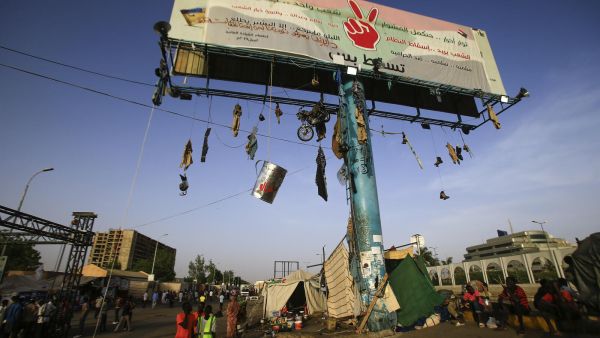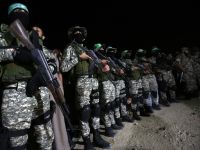What happens the day after a massive protest overcomes the odds and realizes its principal demand? Can it keep its momentum to ensure the rest of its demands are met? Or do people go home, satisfied that they’ve made a small step towards a future they’ve been fighting for?
Some mass movements have dissipated after meeting initial friction; others drifted apart or fragmented after seeing some success. But the protests in Sudan, which have been ongoing since Dec 2018, are demonstrating the power of perseverance.
They took down Sudan’s dictator, Omar al-Bashir, who ruled the country for 30 years.
Protesters have continued to pour into the streets of Khartoum, because they recognize that although Bashir is gone, his regime has been reincarnated by the ruling military council that is now vying to cement its presence. The man may be gone but his kleptocracy that ran Sudan’s economy into the ground remains.
Protesters have continued to pour into the streets of Khartoum, because they recognize that although Bashir is gone, his regime has been reincarnated by the ruling military council that is now vying to cement its presence. The man may be gone but his kleptocracy that ran Sudan’s economy into the ground remains.
Knowing their mission is not over until the military council cedes power, thousands are still turning out to demonstrations across the country.
Al Bawaba spoke with Eric Reeves to understand how the protests have achieved what they have, and exactly what obstacles they must overcome to finally realize their main goal of ousting the remnants of Bashir’s dictatorship.
Eric Reeves (Eric Reeves)
Eric Reeves is a seasoned veteran of Sudan’s politics: he’s spent roughly two decades traveling to the country, documenting rights abuses and the ongoing genocide in Darfur, and pushing for sustained awareness to the myriad human rights issues Sudanese people face. Reeves is a Senior Fellow at Harvard University’s François-Xavier Bagnoud Center for Health and Human Rights and is the author of the book “ A Long Day’s Dying: Critical Moments in the Darfur Genocide”
A Destined Revolution
Protesters in Khartoum, Sudan May 19, 2019 (AFP/FILE)
In Reeves’ career, he has been asked constantly, “when is the regime going to fall?” And his answer always remained the same: “when people are angrier than they are fearful of bullets.”
That boiling point has now been reached.
For six months, protesters have taken to the streets of Sudan’s cities. In Khartoum, where they are focused now, droves of protesters occupy the city’s main streets at night after breaking their fast.
The first protests broke out when the government announced cuts to pensions and that breed prices would triple. For many, the austerity measures were too much to take, and the only way to guarantee their well-being was by demonstrating in the hopes the regime ruling over them would fall.
“If you look at the economy; it is not collapsing, it has collapsed,” Reeves says.
Inflation stands at around 120 percent, the state cannot afford to import many goods, and the effect this has had on people’s daily lives has been devastating. “So what you had in Atbara [where protests began] was the spark that set off a congregation that was destined—destined—to occur,” Reeves argues.
On April 11, Sudan’s long-time strongman Omar al-Bashir announced he would resign. The protesters celebrated, but knew that was just the beginning of their struggle against their country’s ruling regime, of which Bashir was a figurehead.
Although they are met with lethal forces by military council forces and armed men aligned with the current ruling order, they refuse to break up their protests.
“There’s just absolutely no doubt about what people want: they want regime change.” Regime change in Sudan doesn’t just mean a dictator like al-Bashir abdicating the political throne he built for himself, it also means the rapid departure of all the covert elements that propped up his government: plutocrats, corrupt trade ministers and shady militia commanders alike.
The Remnants of Bashir’s Regime
Hemeti speaking at a press conference in May 18, 2019 (AFP/FILE)
The military council that replaced Bashir and is now ruling over Sudan is, according to Reeves, an insidious extension of Bashir’s regime. Mohamed Hamdan “Hemeti” Dagalo, a commander who got his start slaughtering Darfuris is emerging as its leader.
“Hemeti is guilty of massive atrocity crimes: genocide, crimes against humanity, war crimes in Darfur. We know it.”
Reeves has been one of a cacophony of researchers documenting Hemeti’s many pillaging campaigns throughout Sudan using his Rapid Support Forces (RSF); a state-backed militia that is accountable to no one but Hemeti himself.
“Hemeti is the big problem... He is the obstacle to a civilian-led transition.”
In his conversation with Al Bawaba, Reeves observes that one reason why protesters persevere through the hellfire of bullets rained on them by Hemeti’s RSF forces, is because they know they only have this one window of opportunity. If they go home and Hemeti takes over, they will resign themselves to the same struggles they had to live with under Bashir.
In his conversation with Al Bawaba, Reeves observes that one reason why protesters persevere through the hellfire of bullets rained on them by Hemeti’s RSF forces, is because they know they only have this one window of opportunity. If they go home and Hemeti takes over, they will resign themselves to the same struggles they had to live with under Bashir.
“These people know this is a once in a lifetime chance. If they go home without civilian governance, they’ll never get it. And they know it.”







